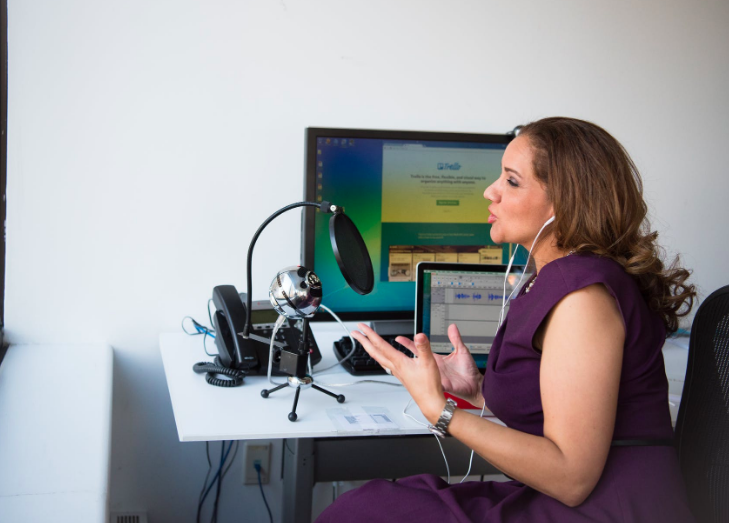Podcasts are gaining in popularity. In June, Spotify announced a new feature that lets users easily find podcasts to enjoy. Additionally, the streaming platform signed an exclusive podcast deal with the Obamas. Podcasts have momentum — and interest — on their side.
Nearly one in three Americans has listened to a podcast over the past month. These audio episodes represent another new channel businesses can use to get their message to engaged listeners.
Podcast advertising is booming, with podcast ads set to double their share of the audio advertising market in the next few years. But this hot-ticket media buy comes with a price tag. To get the highest return on their podcast advertising investment, brands should endeavor to control the message as much as possible.
Control Can Be a Good Thing
Podcasts capture the attention of potential customers (who, it seems, are happy to spend their money). Any messaging you deploy can be amplified — with good or not-so-good results, depending on the host and audience fit. “Podcasts are an attention-commanding medium,” says Joe Copeman, managing director at Acast, a global podcast marketplace. “Listeners are far less likely to be doing other things which require attention from their ears and brains whilst listening — meaning brand messages are far more likely to resonate.”
Just like you entrust influencers with your brand message, you want podcast advertisers to create a positive association with your brand. Unless you’re producing podcast content yourself (as ZipRecruiter, Slack, and others have done), there’s no guarantee how your message will come across. Still, there are effective ways to shape the podcast message you’re associated with.
1. Be choosy about the podcast host.
Listeners trust podcast hosts, so find the most natural fit with your brand. Ensure the host is educated about and supports your product. Hosts often go off-script, so it’s best to provide a few talking points. You can even find ways to quickly educate hosts on your product. Ahrefs, an SEO tool set company, got better organic ad reads when hosts had at least run through a product tutorial.
Buck Robinson is a partner and chief radio strategist at The Media Manager, a direct response agency focused on print, radio, and television. He describes the opportunity a podcast host presents for a sponsor: “They are giving their blessing — and the authenticity and gravitas that goes along with it — to one company: yours!” A host’s seal of approval is the holy grail: It suggests an exclusive endorsement of your product. It also overlays some of the goodwill the podcast’s audience has onto your brand. To maximize this situation, ensure the host has an in-depth knowledge of your offerings.
2. Make a guest appearance.
In addition to sponsoring a podcast with an ad, have someone from your company appear as a guest speaker. The podcast hosts might edit your message when they deliver it. But when you’re speaking on behalf of your brand, you have total control of the words coming out of your mouth. A brand representative is also a great way to humanize your company and add your own flavor to a podcast.
This approach works for solopreneur Richie Norton, who asserts that 80% of his business leads originate from his podcast guest appearances. He’s done at least 300 appearances, helping to not only promote his brand but also position himself as an expert in his field. There’s nothing stopping you from finding leads this way, but you don’t have to make hundreds of appearances. Look for podcasts that align with topics relevant to your company, as well as ones that feature guests often. Once an episode airs, be sure to share the link on your social channels.
3. Collaborate with podcast producers.
The most control you can have over your message’s transmission: having a hand in the production. This gives you buy-in and a large amount of control over the final product. If you have the resources and know-how to create your own podcast, you could start one quickly and affordably.
If you aren’t ready to produce in-house podcasts, a nice middle ground is to collaborate with an entity experienced in content production. BMW, for example, recently did a six-episode podcast series collaboration with The New York Times and The Infatuation. “The Special” explored six American cities, with each episode featuring interviews with culture experts. They culminated with a recipe prepared by a local chef from that week’s city. Cosmetics company Sephora similarly teamed up with Girlboss Radio to create a podcast called #LIPSTORIES, celebrating stories from female founders and creators.
The podcast world — and the advertising pouring into it — will only grow in the next few years. Don’t miss the wave. Start now by selecting podcast hosts to represent your brand or planning a collaboration. Don’t be shy about appearing on-air yourself. By deploying your advertising dollars effectively, you can make podcasting work for your business.


















